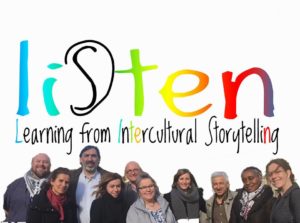The LISTEN project aims at introducing storytelling approaches and techniques to a radio environment as a binding factor which brings social and personal benefits for refugees. Those techniques will serve to develop in refugee’s and migrant’s personality a construction of personal values, a higher level of self- esteem, and a stronger sense of identity in the community. They could develop for example verbal and communication skills, foreign language skills, improvement of intercultural understanding and social skills and reasoning. Being equipped with these skills and more, refugees and migrants can b e a future “cultural mediator” between their community and the hosting society in order to promote reciprocal knowledge and comprehension between subjects of different cultural backgrounds.
e a future “cultural mediator” between their community and the hosting society in order to promote reciprocal knowledge and comprehension between subjects of different cultural backgrounds.
The storytelling approach will help to build a bridge between refugees and the community, on the one hand, trying to integrate this group and, on the other hand, making the community to “think outside the box”, to see the humanitarian aspect of these people who have lost everything and are trying to find themselves in the new living society. Storytelling can be also a window into the culture from which refugees come, can help the society think differently, be more sensitive, comprehensive and empathic to the culture from where refugees come.
The use of storytelling techniques is seen as an educational strategy in adult learning by enhancing the key competences and improving the language skills of adult learners. Taking into consideration the big chances that radio storytelling means for refugees, a sustainable education approach for trainers and facilitators in this area is missing both on the regional and on the transnational level. Therefore an innovative learning course for trainers based on transferable didactic concepts and methods for radio storytelling will be developed to transfer them to the refugees and to be a tool to empower this group. So at the end the LISTEN project wants to encourage refugees or migrants who experienced involuntary or forced migration to express themselves and to start a dialogue with the receiving societies.
